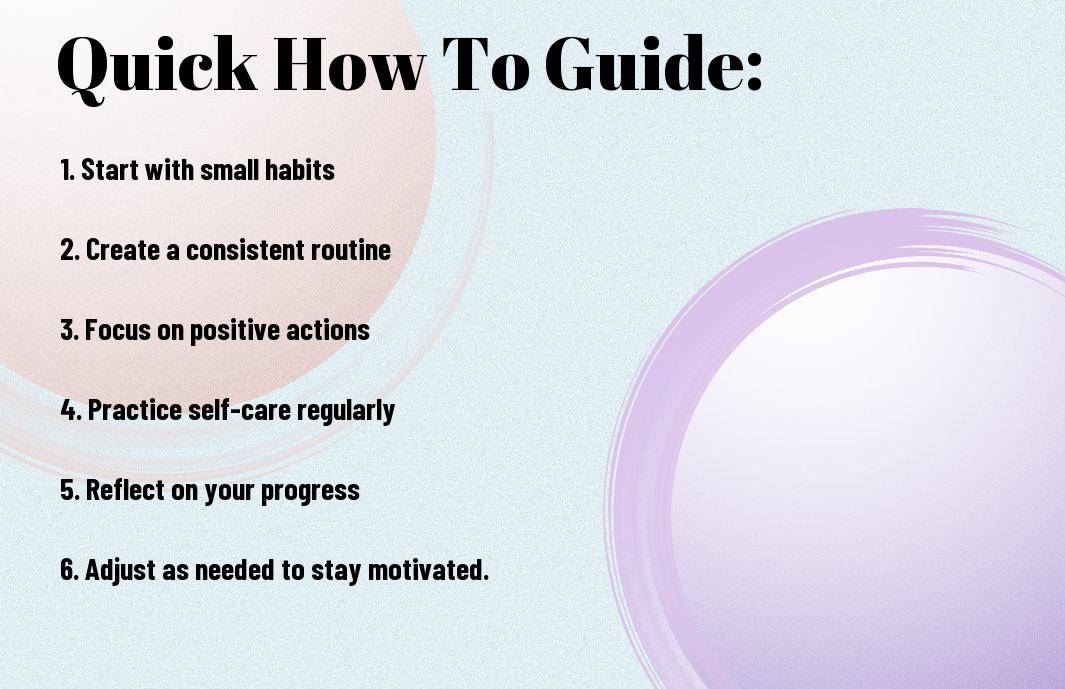Most people underestimate the power of daily routines in shaping their mental health and emotional well-being. By incorporating Atomic Habits into your daily life, you can create a positive impact on your emotional stability. Small changes in your habits can lead to significant improvements in your overall mental well-being.
Key Takeaways:
- Consistency is key when it comes to daily routines for emotional stability.
- Developing healthy habits can greatly impact your mental health in a positive way.
- Creating a structured routine can provide a sense of stability and predictability.
- Small, incremental changes in your routine can lead to long-lasting improvements in mental well-being.
- Practicing self-care activities daily can help reduce stress and improve emotional resilience.
- Regular exercise has been shown to have significant benefits for mental health and emotional stability.
- Seeking professional help is important if you are struggling with mental health issues that impact your daily routine.

The Foundations of Atomic Habits
You can find valuable insights on how to improve your mental health through daily routines and habits by exploring 15 ways to get organized and create habits to improve mental health. Understanding the foundations of atomic habits is crucial for achieving emotional stability and well-being.
The Science of Habit Formation
An understanding of the science behind habit formation is crucial for creating lasting change in your life. At its core, a habit is a behavior that has been repeated enough times to become automatic. The brain forms habits as a way to conserve energy by turning repeated actions into unconscious routines. By recognizing the cues, routines, and rewards that drive our habits, we can intentionally design new patterns that serve our mental health and emotional well-being.
Key Factors Influencing Habit Development
Influencing the development of habits are key factors such as
- Consistency: Repeating the behavior regularly strengthens neural pathways.
- Cues: Environmental or internal triggers that prompt the habit.
- Rewards: Positive outcomes that reinforce the behavior.
This understanding empowers us to make intentional choices in shaping our habits for the betterment of our mental health.
Understanding the power of habit formation can help you cultivate positive daily routines that promote emotional stability. By focusing on consistency, identifying cues, and rewarding yourself for progress, you can establish healthy habits that support your well-being.
Creating Your Mental Health Habit Plan
Your daily routine plays a crucial role in maintaining your mental health. To develop a solid plan, it’s vital to understand your emotional needs and set clear, manageable goals. For a deeper probe the science behind mental toughness, check out The Science of Developing Mental Toughness in Health.
Identifying Your Emotional Needs
Identifying your emotional needs involves reflecting on what makes you feel balanced, fulfilled, and at peace. Take some time to think about the activities, people, and environments that contribute positively to your mental well-being. It could be spending time outdoors, connecting with loved ones, or engaging in creative pursuits. By understanding your emotional needs, you can tailor your daily habits to support your mental health.
Setting Clear and Manageable Goals
Even small steps can lead to significant progress when it comes to improving your mental health. Start by setting clear and manageable goals that align with your emotional needs. Whether it’s incorporating mindfulness practices into your morning routine, scheduling regular exercise sessions, or setting boundaries to protect your energy, having achievable goals can keep you on track towards emotional stability.
Habit: Consistency is key when forming new habits. Focus on one goal at a time and integrate it into your daily routine. Celebrate small wins along the way to stay motivated and committed to your mental health journey.

Atomic Habits for Mental Health – Daily Routines for Emotional Stability
Morning Routines to Start Your Day Right
For those looking to improve their emotional stability, starting the day with a set morning routine can be incredibly beneficial. Creating a morning routine helps to set a positive tone for the day ahead and can significantly impact your emotional well-being. While it may be tempting to hit the snooze button and stay in bed, establishing habits such as meditation, exercise, and gratitude journaling can help you start the day with a clear and focused mindset.
Midday Habits to Maintain Emotional Balance
While morning routines are important, maintaining emotional stability throughout the day is equally vital. Incorporating midday habits like deep breathing exercises, short walks, and healthy eating can help regulate your emotions and keep stress levels in check. These habits can serve as mini-breaks in your day, allowing you to recharge and refocus, ultimately leading to better emotional well-being.
Daily consistency in practicing these midday habits can significantly impact your emotional stability over time. By incorporating these small but meaningful habits into your daily routine, you can develop a strong foundation for long-term emotional health.
Cultivating Positive Evening Habits
All of us at some point have experienced how our evenings can greatly influence our mental well-being. Developing positive evening habits can help us unwind, reflect on our day, and prepare us for a restorative night’s sleep. Let’s explore some key practices that can contribute to emotional stability and overall mental health.
How to Unwind and Reflect
Unwinding after a long day is crucial for letting go of stress and tension. Consider activities like taking a warm bath, practicing mindfulness or meditation, reading a book, or simply listening to calming music. Reflect on your day by journaling about your thoughts and feelings, acknowledging your achievements, and identifying areas for growth. This practice can promote self-awareness and emotional regulation, leading to a more peaceful state of mind before bedtime.
Preparing for Restorative Sleep
Habits play a significant role in preparing our bodies and minds for restorative sleep. Set a consistent bedtime routine by going to bed and waking up at the same time each day. Create a calming environment in your bedroom by keeping it dark, cool, and free of distractions such as screens. Avoid stimulating activities like scrolling through your phone or watching intense television shows before bed. Instead, opt for relaxation techniques like deep breathing or gentle stretches to signal to your body that it’s time to wind down.
Preparing yourself for restorative sleep starts well before you hit the pillow. By cultivating positive evening habits like unwinding and reflecting, and establishing a bedtime routine that promotes relaxation, you can set the stage for a night of peaceful and rejuvenating rest.
Resilience-Building Techniques
Despite the ups and downs of life, building resilience is crucial for maintaining strong mental health. In my blog post about Atomic Habits for Mental Health, I highlight the importance of daily routines and habits that can help cultivate emotional stability and resilience.
Coping Strategies for Difficult Times
An important part of building resilience is developing coping strategies for difficult times. When faced with challenges, it’s important to have a toolbox of techniques to help you navigate through tough situations. Some effective coping strategies include practicing mindfulness, reaching out for support from friends or a therapist, engaging in physical activity, or journaling to process your thoughts and emotions.
How to Bounce Back from Emotional Setbacks
Little setbacks are a natural part of life, but it’s how we bounce back from them that truly matters. Building resilience means developing the ability to recover from emotional setbacks quickly and effectively. It involves reframing negative situations, practicing self-compassion, and learning from the experience to grow stronger.
It’s important to remember that setbacks are not permanent and that you have the power to overcome them. By practicing resilience-building techniques and staying committed to your emotional well-being, you can navigate life’s challenges with strength and grace.
Staying on Track with Your Habits
Many of us struggle to maintain new habits over time. To stay on track with your habits for improved mental health, it’s necessary to monitor your progress and make adjustments along the way.
Monitoring Your Progress
On your journey to establishing atomic habits for greater emotional stability, tracking your progress is key. Setting up a system to monitor your daily routines can help you stay accountable and motivated. Whether it’s using a habit tracker app or a simple checklist, having a visual representation of your efforts can keep you on course. Reflecting on your achievements and setbacks can also provide insight into what works best for you and how you can improve.
Adjusting Your Routine as Needed
Rewards play an important role in habit formation. Consider incorporating small rewards for sticking to your mental health routines. Whether it’s treating yourself to a favorite snack or taking a relaxing break, these incentives can boost your motivation and make the process more enjoyable. Remember to adjust your routine as needed to avoid burnout or loss of interest. If a particular habit isn’t bringing you the expected benefits, don’t hesitate to tweak it or replace it with something more suitable for your needs.
To wrap up
Following this daily routine for emotional stability based on the principles of Atomic Habits can have a profound impact on your mental health. By incorporating small, consistent habits into your life, you can build a strong foundation for emotional well-being. Keep in mind, the key is to focus on incremental progress rather than striving for perfection.
By setting clear intentions, creating a supportive environment, and staying committed to your daily habits, you can cultivate resilience, positivity, and balance in your life. Embrace the power of small changes and watch as they transform your mental health over time. Your emotional well-being is worth the effort!
FAQ
Q: Why is it important to have daily routines for emotional stability?
A: Having daily routines helps provide structure and stability, reducing stress and anxiety levels, and promoting mental well-being.
Q: How can atomic habits help in improving mental health?
A: Atomic habits are small, incremental changes that can lead to significant improvements in mental health over time by establishing positive routines and behaviors.
Q: What are some examples of atomic habits for mental health?
A: Examples include taking a daily walk, practicing mindfulness meditation for 5 minutes each morning, journaling before bed, or setting aside time for self-care activities.
Q: How can I make atomic habits stick for long-term emotional stability?
A: Start small, be consistent, track your progress, and celebrate small wins to create lasting habits that contribute to your emotional well-being.
Q: Can daily routines help in managing stress and anxiety?
A: Yes, establishing daily routines can create a sense of predictability and control, which can be effective in managing stress and anxiety levels.
Q: How do I build a daily routine that supports my emotional stability?
A: Identify activities that bring you joy and relaxation, prioritize self-care, set realistic goals, and slowly incorporate these activities into your daily schedule.
Q: What should I do if I struggle to stick to my daily routines for emotional stability?
A: Be kind to yourself and remember that change takes time. Reassess your routines, make adjustments as needed, seek support from loved ones or a therapist, and keep working towards building healthier habits.



